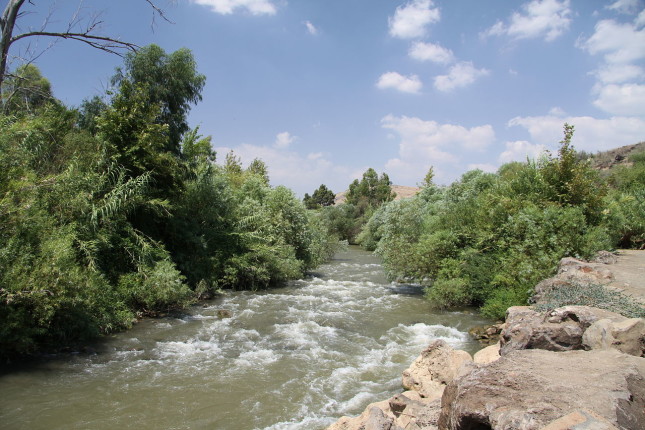-
Middle East: EcoPeace Urges UN to Back Water-Energy Cooperation to Increase Security
June 5, 2019 By Ladeene Freimuth
“Action is needed today,” said EcoPeace Middle East’s Palestinian Co-Director Nada Majdalani. EcoPeace’s Palestinian and Israeli Co-Directors spoke at a recent session of the United Nations Security Council that focused on potential solutions to the decades-old Palestinian-Israeli crisis. They emphasized the importance of cooperation over shared water resources to help address human health and national, regional, and global security concerns. While EcoPeace has been working to foster cooperation over water for more than 25 years, as a way to build peace in the Middle East, this was the first time the trilateral organization briefed the Security Council.
With just four hours of electricity per day, on average, wastewater facilities fail to operate, Majdalani said. As a consequence, the equivalent of 34 Olympic-size swimming pools of inadequately treated water carrying sewage and water-borne diseases are dumped into the Mediterranean Sea each day. The effects can be devastating. She told the story of a five-year-old boy from Gaza who died 10 days after swimming in contaminated water.
The spread of water-borne diseases, such as cholera, across political boundaries could cause more widespread humanitarian and security threats, as a result. Thus, it is in the interest of neighboring countries and the world to try to solve these challenges.
EcoPeace called on the UN Security Council to recognize climate change as a “threat multiplier” for water and health insecurity and political instability. Doing so should spur the Security Council to act now to support cross-border cooperation, and thereby help achieve national, regional, and global security.
Fortunately, technology is a “game changer” for the region, said EcoPeace Israeli Co-Director Gidon Bromberg. He painted a picture of a unique exchange among these parties of water (i.e., using desalination) and solar energy that can be harnessed and sold as an engine for economic and political stability in the Middle East. EcoPeace noted that this groundbreaking model of cooperation should be of great interest to the United Nations, the region, and the world, more broadly.
In the Oslo Peace Accords, water was deemed a “final status” issue and therefore deferred into the future. With these technological advances, EcoPeace’s leaders urged the UN to take a different course and not hold water “hostage to the conflict.” Let us “set water free to give life and hope to our region,” Bromberg said. He concluded by calling on the Security Council “to urge our three governments, Israel, Palestine, and Jordan, . . . to advance cooperation on water and the environment, including the rehabilitation of the Jordan River and Dead Sea, . . . and implement a Water-Energy Exchange for our shared future – in the face of climate change – in the context of a two-State solution. We call on the Security Council to invite all relevant UN agencies and international organizations . . . to help facilitate the implementation of these objectives.”
Ladeene Freimuth is a Wilson Center Global Fellow and President of The Freimuth Group, a domestic and global energy and environmental consulting firm. She previously worked in the U.S. House, Senate, Executive Branch, private sector, and overseas, including as Deputy Director of EcoPeace Middle East’s Israeli Office (2007-2008).
Source: UN Web TV
Photo Credits: Jordan River park in Israel during summer, August, 2011. Wikimedia Commons user Chmee2.
 A Publication of the Stimson Center.
A Publication of the Stimson Center.



